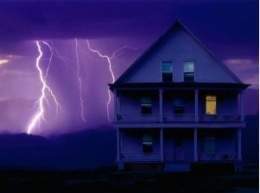(from the Latin astrum, and from the Greek —φοβία, “fear”), also known as astrapophobia, brontophobia, ceraunophobia or tonitrophobia, is the irrational fear of thunder, lightning and storms. It is especially common in children. It is also often called “fear of storms.”

Common phobia
Astraphobia or fear of storms – thunder and lightning – is a very common phobia in young children, although it can also occur in adults.
As a defense mechanism, children usually hide in places where there are no windows, such as in a closet or under the bed, so it is important that their parents teach them to go to places in the house, where it is more difficult to hear thunder ; If the children are older, it will be useful for them to know the real causes of how these phenomena occur.
Treatment
The treatment of astraphobia is similar to that of all other phobias: gradually exposing the patient to the feared is the most effective method. Teaching the affected person to breathe slowly during the crisis can be helpful, as are hypnosis-based therapies in some cases.
Treatment may in some cases include medications to calm anxiety, but it is much more effective to resort to exposure to the feared stimulus, and to practice breathing techniques.
It will not be necessary to seek treatment for children, even if they feel extreme fear, unless the problem persists for more than six months.
Clinical picture
Symptoms, as in other phobias, include panic, shortness of breath, rapid heartbeat, sweating, and nausea. The phobic usually feels out of control of these symptoms.
Many sufferers try to control their phobia by hiding during storms. Children typically hide in windowless places, such as in a closet, under the bed, or anywhere else where they can avoid seeing lightning and hearing thunder include shortness of breath, sweating, nausea, palpitations; as well as panic attacks and great physical and psychological discomfort, which becomes more evident as the storm continues, these symptoms becoming completely overwhelming. Some adults also have an obsession with the weather forecast.
